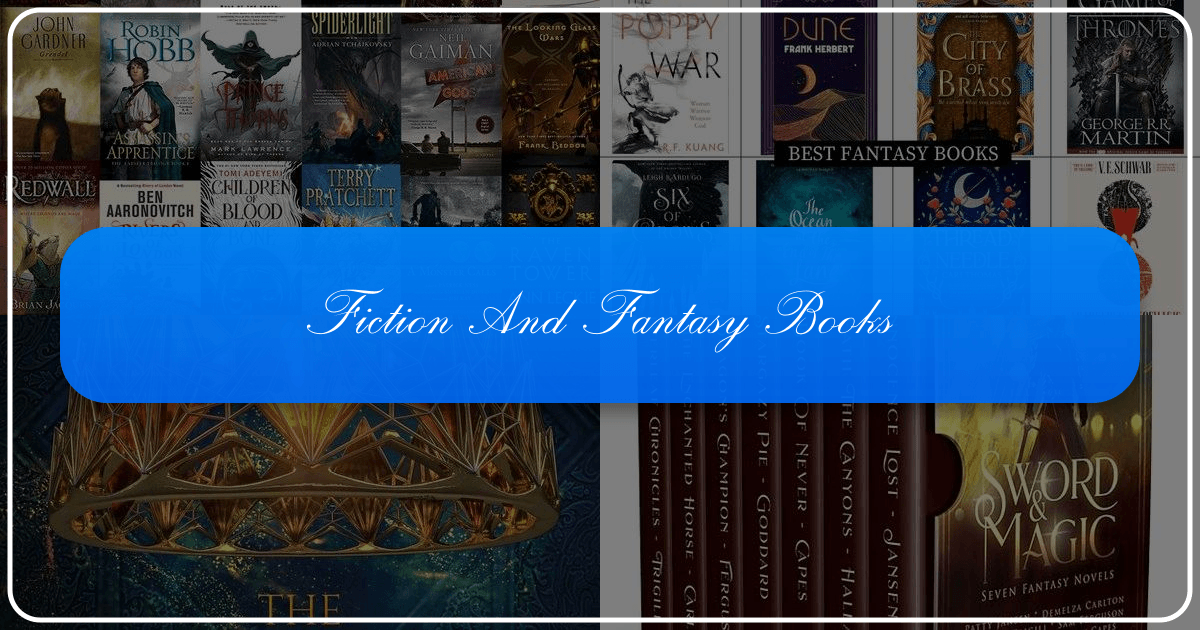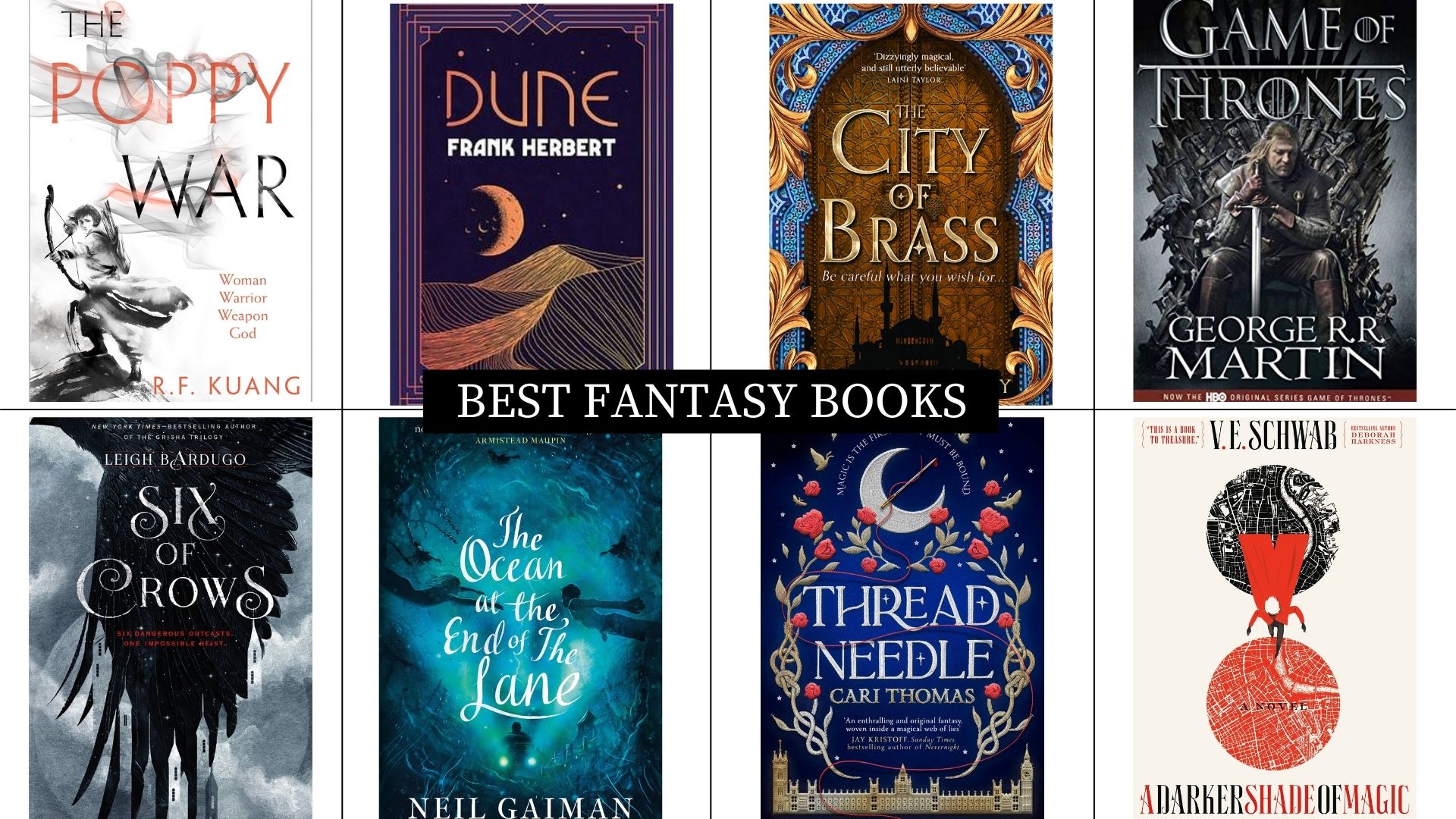Fiction and Fantasy Books: A Deep Dive into Imagined Worlds

Fiction and fantasy books offer an unparalleled escape, transporting readers to realms beyond imagination. From sprawling epics to intimate character studies, the genre’s versatility allows for exploration of diverse themes and narratives, reflecting and refracting our own world in countless fascinating ways. This comprehensive exploration delves into the core elements of fiction and fantasy literature, examining its genres, authors, educational value, and enduring cultural impact.
The Landscape of Fiction and Fantasy Genres
The world of fiction and fantasy is vast and varied. Genres within the broader umbrella of fantasy are often fluid and overlapping, but some key distinctions can be made. High fantasy, for example, typically features expansive, meticulously crafted worlds with intricate magic systems, often involving quests, epic battles, and a struggle between good and evil. Think of the grandeur of J.R.R. Tolkien’s The Lord of the Rings or the morally ambiguous conflicts in George R.R. Martin’s A Song of Ice and Fire.
In contrast, low fantasy, or contemporary fantasy, integrates fantastical elements into a recognizable, modern setting. Urban fantasy, a subgenre of contemporary fantasy, often places magical creatures and events within a bustling city backdrop. Examples include Ben Aaronovitch’s Rivers of London series, which blends police procedurals with magical realism, and the dark, gritty urban fantasy worlds of Jim Butcher’s Dresden Files.

Other notable subgenres include grimdark fantasy, characterized by its cynical tone, morally gray characters, and brutal violence. The works of Mark Lawrence, with their unflinching portrayal of anti-heroes, epitomize this trend. Historical fantasy blends fantastical elements with historical settings, often drawing inspiration from real-world cultures and events. Guy Gavriel Kay’s novels, such as Tigana and Under Heaven, masterfully weave this blend of historical detail and magical realism. Finally, portal fantasy transports characters from our world to another, often contrasting the familiar with the fantastical. Examples include C.S. Lewis’s classic The Chronicles of Narnia.

Exploring the Literary Giants and Emerging Voices
The richness of fiction and fantasy literature rests not only on its diverse genres but also on the remarkable talent of its authors. Established masters like J.R.R. Tolkien and Ursula K. Le Guin have left an indelible mark on the genre, establishing iconic worlds and characters that continue to inspire generations of readers and writers. Tolkien’s meticulously crafted world of Middle-earth and Le Guin’s exploration of magic and morality in Earthsea are cornerstones of the genre’s canon.
Contemporary authors like Neil Gaiman and Brandon Sanderson have pushed the boundaries of fantasy, Gaiman with his darkly whimsical stories that blur the lines between mythology and modern life (e.g., American Gods), and Sanderson with his intricate magic systems and epic-scale storytelling (e.g., Mistborn). Emerging authors constantly revitalize the genre with fresh perspectives, innovative storytelling techniques, and diverse narratives. This includes writers like N.K. Jemisin, whose Broken Earth trilogy tackles complex social and political issues, and Leigh Bardugo, whose Grishaverse combines fantasy with intricate political intrigue.

Deep Dives into Select Authors and Their Works
The depth and breadth of the genre demand a closer look at several influential authors and their contributions. This section will focus on a few key authors:
J.R.R. Tolkien: Tolkien’s The Lord of the Rings is more than just a fantasy novel; it’s a foundational text that shaped the landscape of high fantasy. Its intricate world-building, complex mythology, and exploration of themes like good versus evil, friendship, and sacrifice have had a profound and lasting impact on literature and popular culture. His meticulous creation of languages, cultures, and histories elevated the genre to new levels of depth and immersion.
Ursula K. Le Guin: Le Guin’s Earthsea cycle offers a more nuanced approach to fantasy, focusing on character development, moral ambiguity, and the consequences of wielding power. Her work often examines themes of balance, responsibility, and self-discovery, offering a richer and more philosophical dimension to the genre.
Neil Gaiman: Gaiman’s distinct style, blending dark fantasy, mythology, and modern anxieties, sets him apart. American Gods, for instance, ingeniously reimagines ancient deities as struggling figures in contemporary America, making the familiar feel unexpectedly strange. His work appeals to readers of all ages.
Brandon Sanderson: Sanderson is recognized for his meticulous world-building and innovative magic systems, often called “hard magic” systems. His work is characterized by intricate plots, memorable characters, and satisfying resolutions. The Mistborn series and the expansive Stormlight Archive are testaments to his epic storytelling abilities.
N.K. Jemisin: Jemisin has gained immense recognition for her bold narratives and unflinching examination of social issues within her fantasy worlds. The Broken Earth trilogy, a landmark achievement in the genre, tackles themes of oppression, climate change, and systemic power structures.
Leigh Bardugo: Bardugo’s Grishaverse skillfully blends fantasy, romance, and political intrigue, creating a compelling world with its own unique magic system and intriguing characters. Her novels appeal to young adult readers and adults alike.
The Educational Value and Life Lessons of Fiction and Fantasy
Beyond entertainment, fiction and fantasy books provide opportunities for learning and personal growth. They can offer valuable insights into different cultures, historical periods, and belief systems, expanding readers’ understanding of the world and its complexities.
Many fantasy novels tackle timeless themes such as courage, perseverance, friendship, love, and loss. These narratives can inspire readers to confront their challenges, develop resilience, and foster empathy. Furthermore, the act of reading itself improves cognitive abilities, vocabulary, and critical thinking skills, contributing to overall intellectual development.
Reading fiction and fantasy allows us to explore difficult topics and perspectives in a safe, distanced manner. The metaphorical nature of fantasy can make it easier to grapple with issues such as war, oppression, and prejudice, fostering a deeper understanding and sensitivity.
Analyzing the themes and characters in fantasy novels can enhance critical thinking abilities and improve communication skills. Readers learn to analyze characters’ motivations, evaluate plot developments, and discern authorial intent.
The Role of Libraries and Archives in Preserving the Genre
Libraries and archives play a crucial role in preserving and disseminating fiction and fantasy literature. Public libraries provide accessibility to a wide range of books, offering readers of all ages the opportunity to discover new authors and explore diverse narratives. Digital libraries extend this accessibility even further, breaking down geographical barriers and making a wealth of literature readily available.
Rare book collections and archives house historical manuscripts, first editions, and other significant materials that provide valuable insights into the evolution of the genre and its literary traditions. These collections serve as essential resources for scholars, researchers, and enthusiasts alike. Preservation efforts are vital to ensuring that the rich heritage of fiction and fantasy literature remains accessible for future generations.
The Cultural Impact and Enduring Legacy of Fiction and Fantasy
Fiction and fantasy literature has had a profound and lasting impact on culture. Its narratives, characters, and themes have permeated various forms of media, from film and television to video games and graphic novels. The popularity of adaptations of The Lord of the Rings, Game of Thrones, and other fantasy works demonstrates the genre’s widespread appeal.
Fantasy’s enduring legacy lies in its ability to reflect and reimagine our world, exploring timeless human experiences and societal challenges through imaginative lenses. It provides an avenue for creative expression, social commentary, and exploration of diverse perspectives. Fan communities dedicated to specific authors, works, and genres have formed online and offline, fostering a sense of shared experience and intellectual exchange. Awards such as the Hugo Award, the Nebula Award, and the World Fantasy Award recognize outstanding achievements in the genre, honoring authors for their creativity and innovation.
The future of fiction and fantasy is as vibrant as its past. With emerging authors pushing boundaries and established masters continuing to captivate readers, the genre’s capacity for storytelling and social commentary continues to grow. Its power to transport readers to other worlds, explore universal themes, and ignite imaginations will likely endure for generations to come.